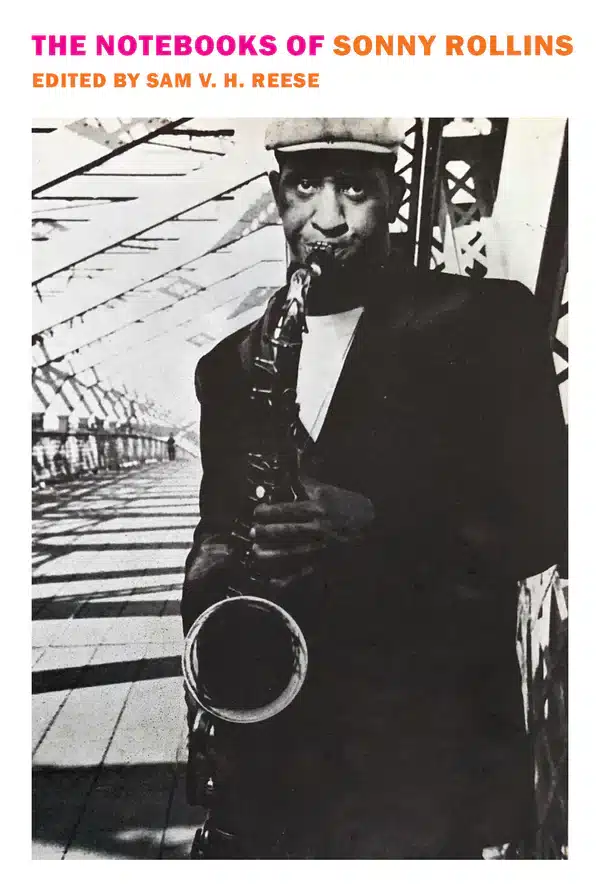I suppose there must have been other moments in life when I felt as giddily happy as seeing Sonny Rollins dive head first into a heroic opening solo on “Falling in Love with Love” at Theatre Royal, Drury Lane in 1993, but they were relatively few and far between. The joy, the pizazz, the sheer transporting thrill of hearing the master play through as many choruses of the careworn tune as he can muster in a breath-defying 12 minutes or so of continuous invention, defied both logic and, it would seem, nature. As the notes escaped the bell of his horn in a furious torrent of sound it was easy to forget how constructed, how planned, built and made, the whole edifice had been. The witty sidelong quotes from show tunes – the quotes from quotes even – the constant shifting of emphasis from phrase to phrase and the intricate filigree that decorated every single unit of sound, watermarking each consonant of breath with an authoritative personal signature, while still keeping the unstoppable flow coming coming coming, lapping over us like a tidal wave of beneficent power, was something to see and hear. Phew, you wanted to exclaim when he at last took the horn out of his mouth and tossed the tune over to the band, like throwing them a bone.
His last concert was in 2012, but the memories linger on. Drury Lane in the 90s, along with Brecon, Bath and the Barbican, which became his latter day London home, were all stupendous. If Rollins is like this now, you thought, what was he like in his true pomp (although I’d argue that the pomp lasted for a good five decades of live performance, which was the art that Rollins excelled at above all else)? Never the creature of any one record label, Rollins’ recording career had inevitable ups and downs, but seen live, he was unimpeachably great. What, then, is he like as a writer, is the question raised by the publication of this relatively slim volume culled from voluminous journal entries, notes and drafts?
Well, it’s a puzzle. Rollins is a deep thinker, but not always a clear one and this is a book that is almost impossible to read chronologically, or perhaps even to read at all unless you are a saxophonist able to share the very recondite musicianly references relating to practice routines, embouchure and mouthpieces. A collection of apparently stand-alone aphorisms and recollected thoughts on a variety of subjects relating to his profession and interests, there are plenty of nuggets if you have the patience to look for them, but a lot of clinker too. If you keep at it, and dip in repeatedly to whatever takes your fancy, the effort does bring rewards.
Partly this must be the consequence of the way the book was written and put together. Arising out of a mighty archive which Rollins has left to New York Public Library and Harlem’s Schomburg Center, it comprises excerpts from Rollins’ collected journals, and entries originally intended for an uncompleted educational work on the saxophone. Rollins is a serious student of his instrument, of music and of philosophy, and everything he says testifies to an enquiring seeker’s and autodidact’s mind. He sets himself very high standard to live by and chides his own weaknesses and failings – repeated comments on overcoming an addiction to cigarettes may stand in for stronger stimulants too, although the volume is relatively silent on this subject. The emphasis on the sheer volume of work – the intense, monastic-like training in every aspect of mastering the saxophonist’s art – that went into making him the towering figure he became is also very moving.
The organisation of the material into four chronological sections by editor Sam Reese – a New Zealander who teaches at York St John University – helps to give at least some kind of shape to what can otherwise appear quite random entries, and it is the final section, ‘1970-2010: Legacy’ (surely too long a chronological marker?), where the very humble Rollins begins to give himself a little more slack, and to become more openly critical. “This government doesn’t give a damn about freedom for the people. It has nothing to do with freedom. It’s about power, it’s about money, it’s about racism and elitism and greed”, he writes, but what exact government he refers to isn’t clear. There’s also a wonderfully nostalgic list of favourite films, books and records, and a gently chiding letter to Michelle Obama thanking her for her hospitality at the White House and drawing her attention to the NEA’s dropping of its Jazz Masters programme. “For jazz music is not a fad”, he writes. “It has no beginning and it has no endings. I’m sure there are other expenditures which are important. But this is another important one.” In the end, as with his playing, it’s the indefatigable nature of Rollins’ search for meaning, for the right word, or the right note and musical phrase, and the warmth of his very human responses, that impresses. We shall not, one feels by the end, see his like again.



2 responses
““This government doesn’t give a damn about freedom for the people. It has nothing to do with freedom. It’s about power, it’s about money, it’s about racism and elitism and greed”, he writes, but what exact government he refers to isn’t clear.”
I think it could apply to any government anywhere in the world. For each country it is the same old, same old. We can see it in Britain – anyone who thinks Starmer and his pals will be any different to the current shower are living in cloud-cuckoo land – on most things both leaders agree, it is just that the principle of Buggins turn indicates that the toolmakers son has a go now. Sonny Rollins, as perceptive as ever.
How can I speak to Sonny Rollins… m cousin play with him in the 50’s
Trumpeter Emery Humphrey Thompson